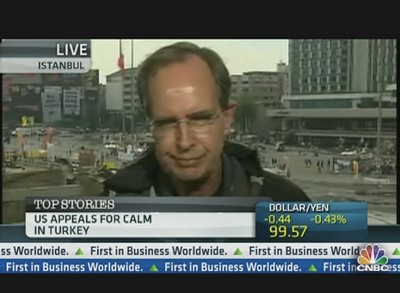Turkey's Rulers Show They're No Good With a Crisis
By: Jen Alic
Five days of protests in Turkey highlight
the government's horrific crisis mismanagement and serves as a wake-up
call for a ruling party that was caught off guard, basking in its
solidification of power and its progress toward becoming a major energy
hub.
The mass protests, which have now been joined by the 240,000-strong trade unions, were unexpected—largely because they weren't planned in the first place.
The mass protests, which have now been joined by the 240,000-strong trade unions, were unexpected—largely because they weren't planned in the first place.
It started with a group of concerned
citizens who on Friday took issue with plans to raze Gezi Park—the last
patch of green in Istanbul—to make way for an Ottoman-style military
barracks and a shopping mall. It very quickly became broad
anti-government protests and clashes overnight, spreading to Ankara,
Izmir and the majority of Turkey's provinces.
More From OilPrice.com:
Turkey: Game-Changing Oil & Gas Legislation Afoot
Moscow Eager to Retain Azeri Oil Transit
Lots of Energy, Little Access: Africa and Asia in the Dark
For that metamorphosis, the government has only itself to blame. It responded to the Gezi Park sit-in with tear gas and water cannons, unleashing public anger that has been held in check only by the country's economic gains.
When two protesters were killed and hundreds of others wounded, they became something very different than a group of citizens seeking an audience with city officials over the Taksim Square greenery.
Turkish Prime Minister Recep Erdogan, leader of the Justice and Development Party (AKP), has mismanaged the crisis, misjudged his authority and made the fatal of mistake of underestimating the barely contained public resentment towards the AKP. Since the over-the-top police response, Erdogan has continued to mismanage things, adding fuel to the fire with arrogant comments.
In the meantime, all manner of groups are coming out of the woodwork to take advantage of this window of opportunity to hijack the protests for political purposes.
(Read More: Turkey Adds to Complex 'Tapestry' of Oil Risks)
This may actually be the AKP's saving grace, because while half of the Turkish public resents the AKP, it also resents the opposition and those groups who would seek to foment violence and create instability.
More From OilPrice.com:
Turkey: Game-Changing Oil & Gas Legislation Afoot
Moscow Eager to Retain Azeri Oil Transit
Lots of Energy, Little Access: Africa and Asia in the Dark
For that metamorphosis, the government has only itself to blame. It responded to the Gezi Park sit-in with tear gas and water cannons, unleashing public anger that has been held in check only by the country's economic gains.
When two protesters were killed and hundreds of others wounded, they became something very different than a group of citizens seeking an audience with city officials over the Taksim Square greenery.
Turkish Prime Minister Recep Erdogan, leader of the Justice and Development Party (AKP), has mismanaged the crisis, misjudged his authority and made the fatal of mistake of underestimating the barely contained public resentment towards the AKP. Since the over-the-top police response, Erdogan has continued to mismanage things, adding fuel to the fire with arrogant comments.
In the meantime, all manner of groups are coming out of the woodwork to take advantage of this window of opportunity to hijack the protests for political purposes.
(Read More: Turkey Adds to Complex 'Tapestry' of Oil Risks)
This may actually be the AKP's saving grace, because while half of the Turkish public resents the AKP, it also resents the opposition and those groups who would seek to foment violence and create instability.
The AKP has managed to solidify power to
an enormous extent, but it is increasingly viewed as authoritarian. The
party's 2010 confiscation of a major media group, Sabah—and handover to a
colleague of Erdogan's—further fomented resentment that had been
building and ready to explode at the slightest provocation.
It is also not lost on anyone that the contract to develop the mall inside the planned Ottoman-style barracks in Gezi Park is held by Erdogan's son-in-law, Berat Albayrak, who is also CEO of Calik Holdings AS, whose Calik Energy department is a key player on the Turkish oil and gas scene.
It is also not lost on anyone that the contract to develop the mall inside the planned Ottoman-style barracks in Gezi Park is held by Erdogan's son-in-law, Berat Albayrak, who is also CEO of Calik Holdings AS, whose Calik Energy department is a key player on the Turkish oil and gas scene.
Oil and Gas Legislation Endangered?
The turmoil has come at a bad time for
the AKP, which is trying to push through serious oil and gas legislation
that would undermine the country's state-run oil and gas company, TPAO,
and likely see it privatized in a legislative package designed to lure
more foreign investment.
(Read More: US Investor Exits Turkey as Unrest Spirals)
A relative calm returned to Istanbul on Tuesday and Wednesday, but demonstrations continue. For now, despite the gross mismanagement of the crisis, the protests do not likely sound the death knell for the AKP and what is effectively one-party rule in Turkey. But its prized oil and gas legislation may now come under more public scrutiny than it had anticipated just a week ago.
Erdogan will likely heed the lesson here sooner rather than later, and as he has in the past, find an opportunity to somehow use the current uproar to the AKP's advantage. But the clear message now is that while the AKP will forge ahead with its plans, the future will have to see a bit more input from the Turkish public.
(Read More: US Investor Exits Turkey as Unrest Spirals)
A relative calm returned to Istanbul on Tuesday and Wednesday, but demonstrations continue. For now, despite the gross mismanagement of the crisis, the protests do not likely sound the death knell for the AKP and what is effectively one-party rule in Turkey. But its prized oil and gas legislation may now come under more public scrutiny than it had anticipated just a week ago.
Erdogan will likely heed the lesson here sooner rather than later, and as he has in the past, find an opportunity to somehow use the current uproar to the AKP's advantage. But the clear message now is that while the AKP will forge ahead with its plans, the future will have to see a bit more input from the Turkish public.


No comments:
Post a Comment